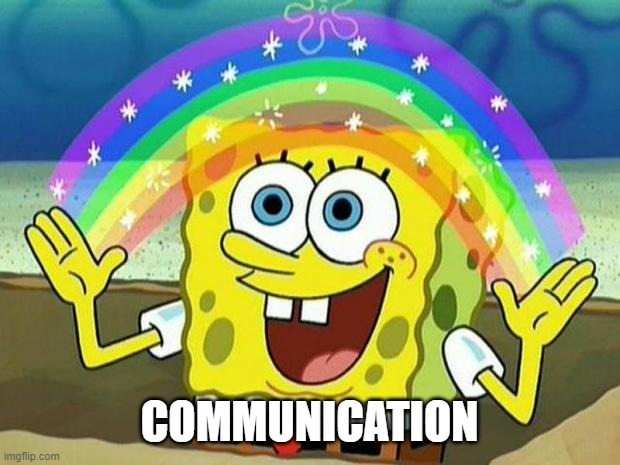Hey everyone, I’m posting this rather informally because I don’t think it’s necessarily a problem in need of addressing at this point, but more a synthesis of what I’ve seen on the internet before and what’s in the back of my head as I’m watching these wonderful conversations going on across Beehaw.
If you have a few minutes to read a blog post, I would like to recommend reading this excellent post where the author uses the term ‘evaporative cooling’ to insightfully evaluate what they’ve noticed about nice people in communities and how it’s really hard to keep them around. If you don’t have a few minutes, the short version of a summary would go something like “nice people have a very low tolerance for people who aren’t nice and their participation has a lot to do with the average amount of jerk-like behavior in a community - if it raises too high, you lose (and likely never regain) the community’s nice people”. They use this as a starting point to discuss why jerk behavior needs to be monitored and kept in check, even when it falls within the rules of a community. This very post helped to shape some of my current ideas and was behind why I pushed so hard to have an extremely limited set of rules and to keep them open to interpretation as much as possible. We had a short stint where we itemized specific kinds of not nice behavior like doxxing, but decided to simplify it down after it was clear people didn’t realize that being nice was actually a rule, because the other rules were much more specific.
I bring all this up because I’ve seen some replies which aren’t openly hostile or not nice, but could reasonably be interpreted as not welcoming. I also have seen a lot of discussion which isn’t explicitly an echo chamber, but I can see how through certain lenses, people might view it as such. As I mentioned before, I’m not exactly worried about these discussions and I think the community has already done a wonderful job self-moderating and calling people in, that is to say, encouraging nice behavior. However, there are a few places where emotions are rather charged. There have been some rather active discussions about political leanings on the internet and the behaviors often exhibited by members of these political groups that rightfully should not be tone policed. However, I would also like for you to take a second and consider how individuals who happen to share these political leanings but do not exhibit the behavior you are calling out might feel accessing or interacting with content on Beehaw. I’m calling on your inherent compassion, to give people the benefit of the doubt and to spend a second considering how others might view what you have to say, and whether it feels inclusive or not. I understand that we’re all human and aren’t going to be perfect at all times and sometimes we need to vent and I’m certainly not here to tone police you, but the more of us are paying attention to how inclusive and nice and safe the space is, the more inclusive and nice and safe the space will ultimately be.
A lot of people have spent time in the last few days to call out that they don’t like echo chambers on the internet. I completely agree with this statement and it’s an important part of our philosophy to do our best to minimize this while still creating a safe space for minorities. However, I’ve often seen this sentiment proposed alongside behavior that is unintentionally a driving force towards creating an echo chamber. A rather minor way which this might play out is the fact that we are currently dominated by the voice of technically proficient individuals - we are currently a tech echo chamber. This can be seen by the relative activity of tech related communities as compared to others (we do a fantastic job with activity for some of our non-tech communities here as compared to most other instances, and I’d like to thank you all for that participation), and the way I’ve seen this play out in a non-inclusive or accepting way is when people are struggling with something technically, and someone else responds with a “oh just do <insert technically complicated thing here>”. They are intending to be helpful, but simply do not know what life is like for someone without their skill set. This can push these people away from interacting with content like this in the future, or even away from the platform entirely. The latter is not particularly likely to happen over something like tech literacy, but I absolutely worry about this for much more emotionally charged issues. We haven’t seen issues with this on Beehaw, but I’ve seen discussions around sex/gender result in some rather non-inclusive behavior because of sex/gender disparities on certain platforms. The most common example of this being problematic is when people post feminist articles in a male-dominated space where the replies reflect this, providing a barrier and incentivizing women to not participate since they correctly read that their voice may be disregarded or that their replies would be met with a slightly increased level of hostility.
We also need to be hyper aware of minorities which are relatively rare due to the law of large numbers. Even if only 1 in 100 people on the internet are jerks, we have to think about how roughly 1 in 2 are women. In this case there’s way more women then jerks, and so articles about women aren’t particularly likely to be overrun with jerk behavior. But if only 1 in 100 are trans, we now have an equal amount of trans people and jerks on the internet. If even 1 of these trans folks don’t want to engage with a jerk, a single bad actor can quickly drive all transgender people off the platform. Please take a moment to think about this through the lens of genuinely nice people who are diverse from you in other ways. We’re here because we want to be nice to each other and want a platform that is a safe space. This necessarily means that there will be people on here who share traits with people you do not like or with people who represent behavior you do not condone. Please do your best to not write them off as an entire group, or present arguments/thoughts which do the same. There is a difference between the words neo-nazi, white supremacist, alt-right, conservative, authoritarian, etc. and we need to be careful about which words we use. Hateful behavior is not allowed and we are explicitly intolerant of intolerant individuals. While a neo-nazi is by definition an intolerant individual, a conservative is not and we should be careful when we feel the need to rightly vent about people being intolerant towards us, so as not to alienate people who are tolerant but do not share the same characteristics be it political leaning, gender, hobbies, or anything else.
I don’t want to end this by only focusing on negative be(e)havior, so I’d like to take a second to stop and reflect that the vast majority of what I’ve seen has been really heartwarming to see. This place has grown massively over the last week, but I do not feel like we’ve shifted too much when it comes to the core values and the feeling I get when I read what you are all posting and commenting. There’s been a lot of content which I so rarely see on other places on the internet that feels so much more welcoming and human than many other spaces on the internet. You’re all wonderful human beings and I’m glad we’ve found a place we can encourage each other and have nice interactions and discussions.
There have been some rather active discussions about political leanings on the internet and the behaviors often exhibited by members of these political groups that rightfully should not be tone policed. However, I would also like for you to take a second and consider how individuals who happen to share these political leanings but do not exhibit the behavior you are calling out might feel accessing or interacting with content on Beehaw.
I think one way to verbalize this is: In the absence of evidence to the contrary, assume the other person is acting in good faith. Try to interpret their statements generously - perhaps English is their second language so they don’t see how a word they used may be offensive, or perhaps they are simply not eloquent about a particular topic and don’t know the correct vocabulary. Maybe they are young and have only been exposed to the viewpoints in their small, less diverse area, and need a little (gentle) education. And consider that even if the person you’re discussing with does not fit into those categories and will not be swayed, maybe someone else who is reading the post you’re making does, and maybe your words will resonate with them.
However, I think it’s also important to acknowledge the fact that it’s not the job of marginalized people to educate the dominant group, so it’s dependent on the entire community to be willing to both listen and educate (while not speaking over those of the marginalized group who are willing to make the effort to speak).
Yep, assuming good faith is explicitly nice behavior.
As for the last point, thank you for calling that out. I’ve tried to do my best to explicitly use the words “tone policing” and other language to highlight important parts of the philosophy of intersectionality. These are the kinds of conversations and behavior where moderating becomes quite tricky and assuming good faith is particularly useful. My barometer of what is acceptable and nice behavior really moves around a lot, depending on the circumstances of who’s involved, the entirety of the conversation, the emotional states of everyone, and how they engage with mediation.
deleted by creator
Something I feel I’m bad at is inclusive language. I want to be in the nice people group and generally when I comment something I try to help. But I was also “called in” because instead of acknowledging someone’s problem first I dived into helping… and they’ve tried virtually all of my helping attempts as well so they felt like I considered them stupid/minimize their problem. Funny enough I was in exactly the same situation before where I felt my problem was minimized, but I never put the two together.
I guess what I’m trying to say is that if I get on your nerves - just let me know. I want to be nice I just lack perspective sometimes.
yes to be absolutely clear good faith needs to go in all directions, my default assumption is that everyone is a human and probably made a mistake and wants to be nice and cooperative but might just need a little help getting there 💜
which is a long way of saying anytime there’s a problem, usually the best way to solve it is a discussion so everyone can understand each other better
Ooo this is a problem I’ve dealt with sometimes. Do you want my solutions? If not I can understand that. After all, not everything should be fixed immediately without more context
I really appreciate you writing this. I also think it’s important for people to try and remember 2 things when talking to people on the internet that can greatly contribute to better communication.
The first being that not everyone is always great at explaining or saying what they are thinking or will explain themselves in a way that makes sense to them but comes across differently to others. If this happens ask for clarification, give someone a chance to further explain what they meant or are trying to say.
Second and probably more importantly these are just words on a screen and any tone that you think is coming across is being put there by your brain because that’s the way you’re reading it and probably not the way it was intended. I’m sure we’ve all gotten upset over a text someone sent because we read it a certain way only to find out after sending back an angry reply and then later talking to them the person sending it didn’t mean it in the way we took it and we were rude back for no reason.
i really love this and i’ve shared more than one of your posts with friends outside of the beehaw ecosystem.
these posts are critical in helping me restructure myself and my thinking.
thank you 💛
look ma, I’m famous 🥰
Not itemizing specific rulebreaking behavior I think can work with a cohesive instance culture. I think that is a good move.
Itemizing rules can lead to ruleslawyer minded people finding things to do which are against the spirit of the rules but not the letter.
The possible downside is of course, mods banning people on unfair and unequally applied whims, but given the nature of federation I think that would be a self correcting problem as users with a sense of fairness leave. Bans, if/when it comes to it, done with transparency can ensure the culture doesn’t develop a mods vs users feel.
Broad rules are great when you trust the ones enforcing it.
To quote the bumper sticker: Have the courage to be kind
I haven’t read this entire post yet (may have additional thoughts after I do), but I wanted to comment to say that it was really cool to see the evaporative cooling post linked here! I read it back around when it was published, and it was really influential on my thinking about online communities.
To anyone who may have skipped the link: you should scroll back up and check it out! It really is an excellent post.
I appreciate you for posting this - I just read your post and the post you linked. I mainly want to concur with what’s been expressed so far, but I also have some personal reflections to share from things I’ve experienced.
One really solid strategy I’ve noticed this community employ to keep the jerk-o-meter down is simply frequently having critical discussions about behavior and user culture. You and the other stewards of this community for holding space for these discussions goes very far; to begin with, it’s difficult to get even a small community to reach a consensus on moderation if conversations like this rarely, or never, take place. Having that consensus is crucial to building a cohesive culture, especially doing it in a way which is inclusive. I think a lot of people who try to build communities, including online, erroneously believe that a healthy community is one where there is no arguing, but really, without dialogues like these, it’s so much easier to disagree on, or forget, what the standard of acceptable behavior even is. We have to keep talking about complex problems in our community together and hashing out our differences constructively - controversy with civility, calling people in, recognizing positive behaviors - if we want to build an inclusive culture and have a sustainable, welcoming online community. Publicly discussing our behavioral standards and our community values (and, thus, arriving at a better collective understanding of what those are) definitely helps a lot.
I also want to agree with what @setsneedtofeed said:
Not itemizing specific rulebreaking behavior I think can work with a cohesive instance culture. I think that is a good move. […] Itemizing rules can lead to ruleslawyer minded people finding things to do which are against the spirit of the rules but not the letter. [link]
Here in particular, I think the mods have been really helpful. Keeping the list of rules limited and broad, but also emphasizing positive examples of behavior rather than simply focusing on the “do-not” rules, has shaped the instance culture in a mostly positive way. Like you said, it’s important that we be mindful in our discourse, “so as not to alienate people who are tolerant but do not share the same characteristics be it political leaning, gender, hobbies, or anything else” - this is even more important than remembering not to be a jerk. It goes a long way that users on Beehaw are strongly focused on being inclusive in an online setting to foster the kind of community we want, rather than only worrying about how to deal with the jerks. Overall, I’d like for people here to continue practicing perspective-taking, not only when it comes to how our words might be received from a marginalized perspective but also when it comes to the effects our language may have on people whom we have other differences with (opinions, political leanings, etc.) but who are generally nice.
This is turning into a bit of a confused ramble, but that’s all I really had to say.
Thank you so much for holding this space 💖
Incredibly thoughtful and thought provoking post.
question for you, if you don’t mind. you mention users ‘calling in’:
“I think the community has already done a wonderful job self-moderating and calling people in, that is to say, encouraging nice behavior.”
what does that look like to you in a public discussion format like beehaw? i read the piece that you hyperlinked, and maybe this is just my ignorance showing, but i still don’t know how this looks when all of the discussion is primarily ‘one-to-many’ as opposed to ‘one-to-one’; for lack of better phrasing.
Honestly it can look like a lot of different things. You could call in someone by saying something along the lines of
“I feel uncomfortable about what you just said, because…”
or “I used to agree with your perspective, but it changed when…”
or "I feel differently about that issue. Can I share my perspective? "or you might even just model what they could have said in a reply or simply ask them whether they think others might perceive that comment as nice or welcoming or inviting or how someone of x background might get upset seeing something like this
this is valuable for reflection. thanks for sharing, i appreciate it
Ahhhh! It’s so refreshing to see someone reference calling in in the wild! I’m a big fan, and agree with everything you’ve said here. I like to think of myself as a nice person, and I can definitely attest to becoming more quiet - and eventually leaving - spaces which are unwelcoming or hostile.
For folks who are wondering about calling in beyond the resources linked here - Loretta Ross teaches online courses on this and they’re literally something like $5. I’ve both taken the classes and moderated for them, and I learn something new every time. It covers things like online spaces and when to use calling out vs. calling in effectively to create spaces that encourage genuine dialogue rather than stifling and silencing it.
I’ma be real, might be best to establish a no politics rule now. I see the tankies on lemmy.ml are pushing pro Chinese stuff that I don’t agree with and i’d rather not see on beehaw. Overall I like the direction you guys are going though.
Please report any/all comments that are not nice that land on Beehaw. We don’t have any control over what’s happening on their instance, however.
Definitely appreciate the idea of avoiding echo chambers, and not going too hard on policing when someone is simply leaning on some political idea, without actually evoking toxic mentalities.
Something in politics I think people should understand is that some people indoctrinated into harmful ideas CAN sometimes change, but they need space to be able to at least ask questions in an open-minded forum about them.
However, of course, at the same time, there are people harmed by those political ideas. Say, a person is from the X Minority, and a contributor in their space either earnestly or dishonestly keeps asking what’s so bad about the “Ban-Rights-For-All-X-Political-Party”. Giving “question askers” a fully guaranteed space to be able to ask their questions sometimes ruins a community.
Drawing that line on what constitutes a hurtful comment can be hard, and I might argue it should even follow lines of indirection. eg, it’s very obvious that a comment “All X should be murdered” is hurtful to a community. I would actually say that someone expressing “I have interest in the ideas of Mr. Y, I think they’re a very intelligent person”, when Mr. Y is a person who believed that all X should be murdered, should actually be equally moderated. What’s critical to me is whether a community can make moderation actions clear - actually connecting how a statement draws harm, and not just falling back on universal statements like “We don’t talk politics”.
A decent amount of this is addressed in the first philosophy post in the sidebar. I’m in agreement that we need to stop hateful speech, and elevating the voice of someone who’s advocating for hate speech is itself hate speech. Letting people debate the human rights of others is intolerance, it’s hate speech, and it’s explicitly not nice behavior that we will not tolerate here.
Ahhhh! It’s so refreshing to see someone reference calling in in the wild! I’m a big fan, and agree with everything you’ve said here. I like to think of myself as a nice person, and I can definitely attest to becoming more quiet - and eventually leaving - spaces which are unwelcoming or hostile.
For folks who are wondering about calling in beyond the resources linked here - Loretta Ross teaches online courses on this and they’re literally something like $5. I’ve both taken the classes and moderated for them, and I learn something new every time. It covers things like online spaces and when to use calling out vs. calling in effectively to create spaces that encourage genuine dialogue rather than stifling and silencing it.












